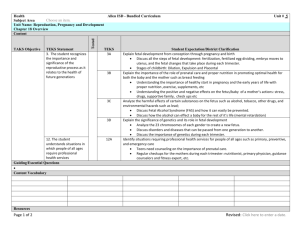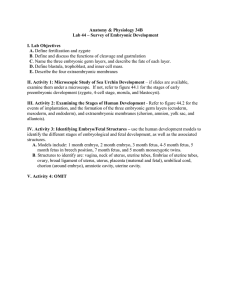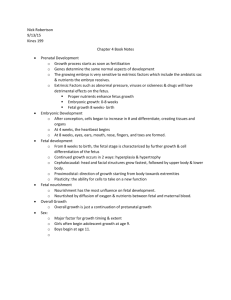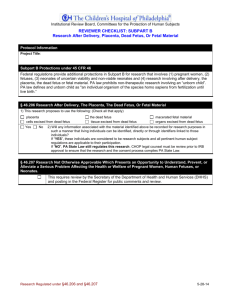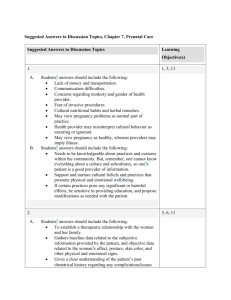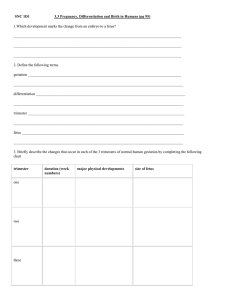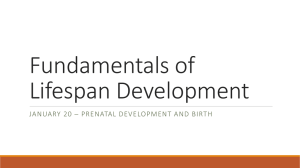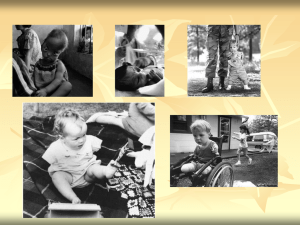Fetal Development 2018
advertisement
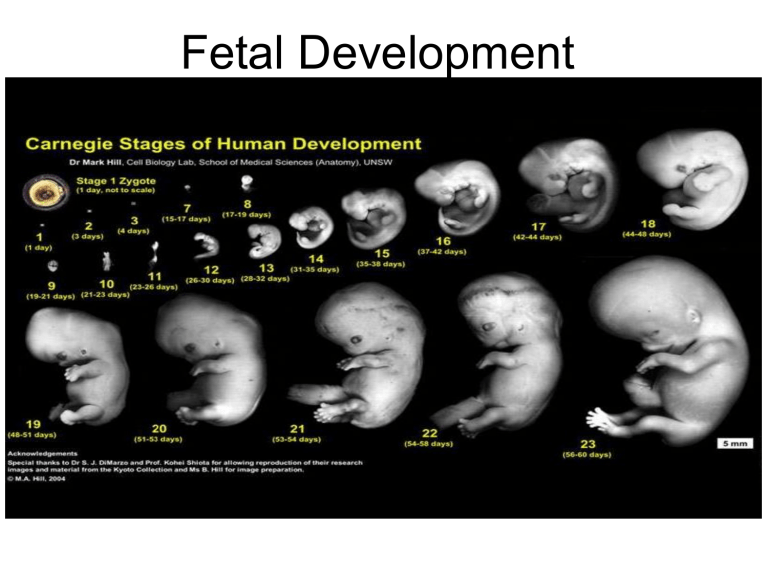
Fetal Development Time zero: An egg surrounded by sperm The moment of conception. Fertilization complete:egg with 2 nucleii 2 cell stage: about 30 minutes 4 cell stage: about 1 hour Morula: “solid ball of cells” day 4 Blastula/Blastocyst: hollow ball of cells Days 5-6 Gastrulation: Day 14 Week 3 Central nervous system begins to develop. Heart development initiated beating begins. Embryo is the size of a poppy seed Week 4 The body and fetal part of placenta are about 1” long and the size of a pigeons egg. The Embryo inside is about 3/8" and weighs less than 1 gram. Protruding from anterior brain, early eyes, and limb buds of arms and legs. nose nose mouth 28 days Size of fetus at 28 days Future eye Future nose Future lips and chin Future chin 28 days Hands and feet 4 weeks (28 days) Week 5 Nose and lips begin to form Brain is developed into 5 parts and lumen of spinal cord is continuous with brain vesicles allowing free cerebral spinal fluid flow. Size of an apple seed 5 weeks 5 weeks Tail is present 5 weeks Week 5 Week 6 The arms, legs, and brain continue to develop Lenses of the eyes appear Nostrils are formed Intestines grow as well as a pancreas Size of a sweet pea 6 weeks What do you think this will become? If you said the hand and fingers, you were right! Week 7 Elbows Form Fingers start to develop Feet start to appear with tiny notches for the toes Ears, eyes and nose start to appear Intestines start to form in the umbilical cord Teeth begin to develop under the gums Embryo is the size of a blueberry Week 8 Major organs begin to develop Cartilage and bones begin to form Structure of eye is still developing The tongue begins to develop Fingers and toes look webbed and short About 1” long and 4 grams In males the sex hormone is produced by the testes 8 weeks 8 weeks 8 weeks 8 weeks Week 9 Embryo begins to move Most joints are formed Fingers can move Fingerprints are shown in skin 2.3 cm in length, weighs about 2 grams 9 Weeks 9 weeks 9 week old face Week 10 Embryo is now called a fetus Eyelids are fused shut and the irises are beginning to develop The placenta begins to function Weighs about 4 grams 10 weeks 10 Weeks 10 weeks 10 weeks Week 11 Fingers and toes are now separated Hair and nails begin to grow Size of a lime Genitals take on gender specific characteristics Amniotic fluid begins to accumulate The muscles in the intestinal walls begin to practice contractions that digest food. 11 Weeks 11 weeks 11 weeks Week 12 Vocal cords begin to form Ears and eyes shift to their normal place Intestines move further into the fetus The fetus’ liver begins to function The pancreas begins to produce insulin Placenta weighs more than the fetus Week 13 The fetus begins to practice inhaling and exhaling movements Eyes and ears continue to move and develop fetal neck is getting longer All nourishment is received from the placenta Week 14 The thyroid gland has matured and the fetus begins producing hormones In boys, the prostate gland develops In girls, the ovaries move from the abdomen to the pelvis Bones are getting harder Skin is transparent Lanugo (very fine hair) covers the fetal body 14 Weeks Week 15 Mothers can begin to feel fluttering movements The three tiny bones (malleus, incus, and stapes ) in his middle ear have begun to harden Eyebrows are beginning to grow Fingernails and toe nails are growing 15 Weeks Week 16 Fat cells begin to form underneath the skin fetus and placenta are about the same size Head and neck are held straighter The Heart is pumping as much as 6 gallons of blood a day and beats at a rate about double your heart rate. Sucking, swallowing and blinking are now evident and possibly hiccupping The fetus can now breathe Complete closure of nasal septum and palate. Fetal heart beat heard with amplification Fetal movement is recognized. Sex is distinguishable now. Week 16. 16 weeks 4 months Week 17 He or she has a much more normal "human" appearance now Pads are forming on his tiny fingertips and toes (finger prints will soon be apparent) Eyes are looking forward now Meconium (composed of products of cell loss, digestive secretion and swallowed amniotic fluid), is accumulating in the bowel Umbilical cord is growing thicker and stronger Male prostate begins to develop Skeleton begins to transform from cartilage to bone Week 18 Vernix (a white cheese-like protective material) forms on baby's skin with the lanugo The placenta continues to grow and nourish the fetus Tiny air sacs called alveoli begin to form in lungs The vocal chords are formed Features of the fetal heart, including ventricles and chambers, should be visible during an ultrasound Week 19 Nerves are being coated with a fatty substance (myelin) Hair on the scalp becomes apparent The milk teeth buds have developed If fetus is female the uterus starts to develop and the vagina, uterus, and fallopian tubes are in place. If it's a boy, the genitals are distinct and recognizable The fetus is swallowing amniotic fluid and his or her kidneys are making urine. Week 20 The fetal heart grows stronger legs are reaching their relative size Immunities are being transferred The nerve cells for taste, smell, hearing, seeing, and touch are now developing If the fetus is a girl, her uterus is starting to develop Fetal heart beat heard: 120160 beats per minute Week 20 Week 21 White blood cells are under production Skin has changed from translucent to become more opaque Tongue is fully formed If the fetus is a girl, her womb and vagina are formed. 5 months 5 Months Week 22 When you talk, read, or sing, expect the fetus to hear you Eyelids and eyebrows are fully formed the fetal brain has entered a stage of rapid growth The fetal liver is starting to break down bilirubin testes begin their descent to the scrotum. Primitive sperm have formed and he is producing testosterone. Week 23 Proportions of the body are now quite similar to a newborn although thinner since he hasn't begun to form body fat Bones located in the middle ear harden The eyes are formed, though the iris still lacks pigmentation The pancreas, essential in the production of hormones, is developing steadily Week 24 Fetus gains about 6 ounces at week 24 of the pregnancy. The weight is in muscle, bone mass and organs. Taste buds begin to form. Over the next seven days the sweat glands will be forming in the skin. This week the fetus is officially considered viable (fit to live) Week 24 Week 25 The structures of the spine begin to form Blood vessels of the lungs develop Fetal nostrils begin to open Week 26 Air sacs in the lungs form now The fetal eyes are opening and beginning to blink Retinas begin to form Fetal brain scans show response to touch. If you shine a light on your abdomen, your baby will turn his head, which according to researchers, means his optic nerve is working. Week 27 Brain continues its rapid growth Eyelids are now open more Week 28 Eyebrows and eyelashes are now very noticeable Eyes are completely formed Muscle tone is improving Lungs are capable of breathing now Fetus in breech position Week 28. Week 29 fetal head is in proportion with body Eyes can move Fetus moving from side to side Week 30 Eyes can move from side to side Early lanugo is beginning to disappear Bone marrow is now in charge of red blood cell production Fetus has the capability now to produce tears Week 31 Fetus may move to the rhythm of music Fat continues to accumulate Calcium, phosphorus and iron are being stored and bones are growing and hardening. Week 32 All five senses are working Toenails are completely formed Should turn to head down position. Skin is red and wrinkly. Week 33 Neurons and synapses are developing in huge numbers Skull is quite pliable and not completely joined If the baby is a boy, his testicles will be descending from his abdomen into his scrotum Week 34 Eyes opened when awake and closed when sleeping Fetus has learned how to blink Week 35 Fat accumulations plumps up the arms and legs Her hearing is fully developed Fetus is now taking up most of the uterus Week 36 This week your baby may drop into the birth canal Skin is growing smooth Gums are very rigid A fully developed pair of kidneys Week 36 Week 36 Week 37 Grasp is firm Baby turns towards light outside the uterus Baby is official full term now Week 38 Circumference of head and abdomen are about the same size for the baby Intestines are accumulating lots of meconium The Third trimester From weeks 27-39 Changes in the Mother: *backaches *decreased BP *swelling in ankles, hands, face *Braxton-Hicks contractions Bibliography "4 Weeks Pregnant." TheBump.com. N.p., n.d. Web. 17 Sept. 2012. <http://pregnant.thebump.com/pregnancy-week-by-week/4-weekspregnant.aspx>. "40 Weeks Pregnant." Pregnancy Week by Week Calendar, Info and Tools. N.p., n.d. Web. 17 Sept. 2012. <http://www.pregnancy.org/fetaldevelopment/week-40>. "PREGNANCY - FETAL DEVELOPMENT." PREGNANCY - FETAL DEVELOPMENT. N.p., n.d. Web. 17 Sept. 2012. <http://www.dcdoctor.com/pages/rightpages_wellnesscenter/pregnancy/fetalde velopment.html>.
